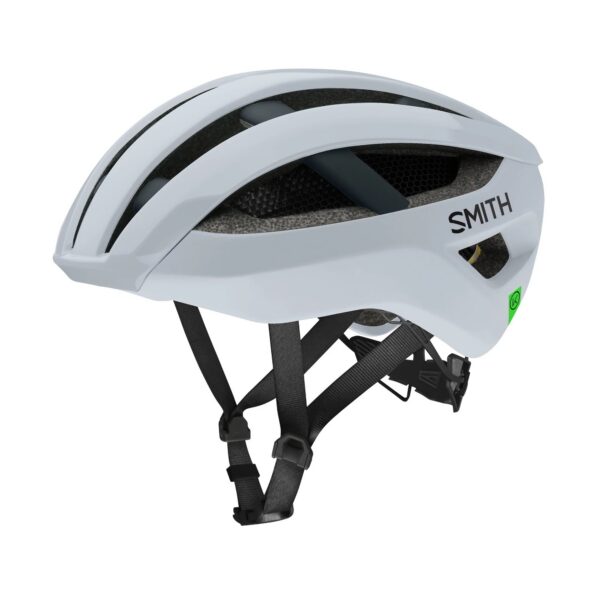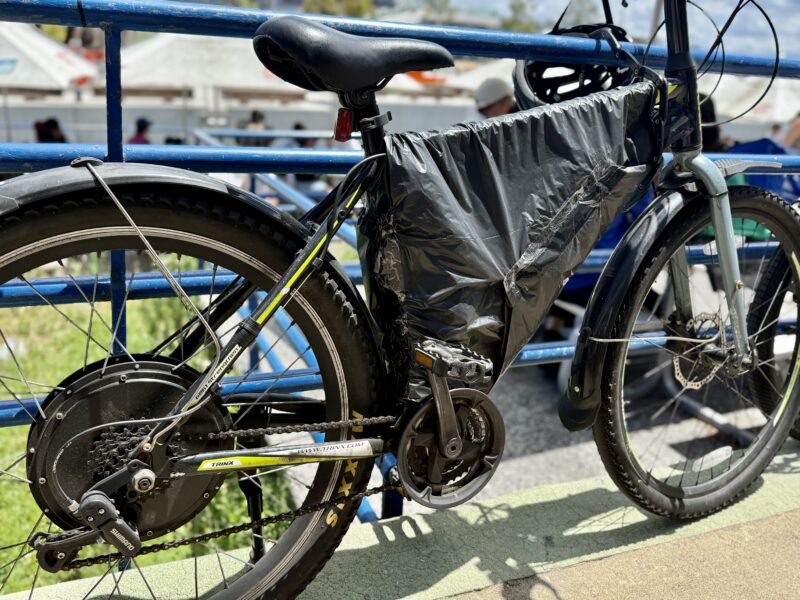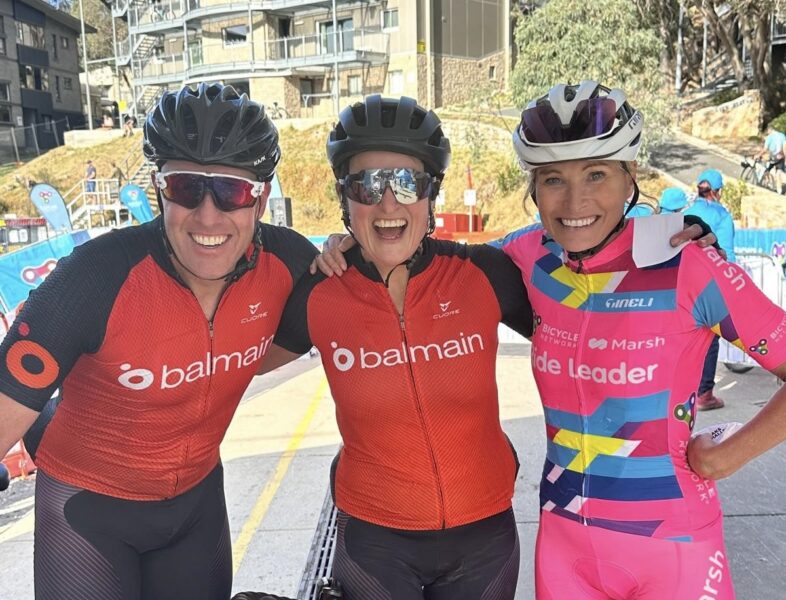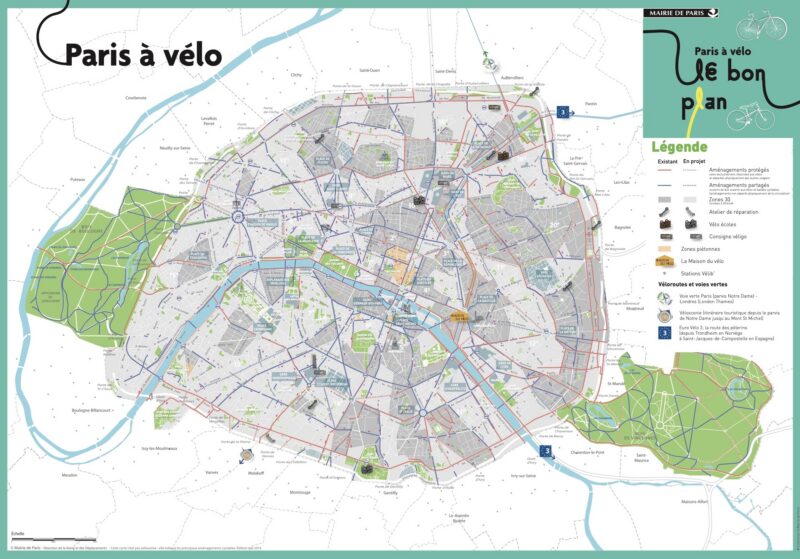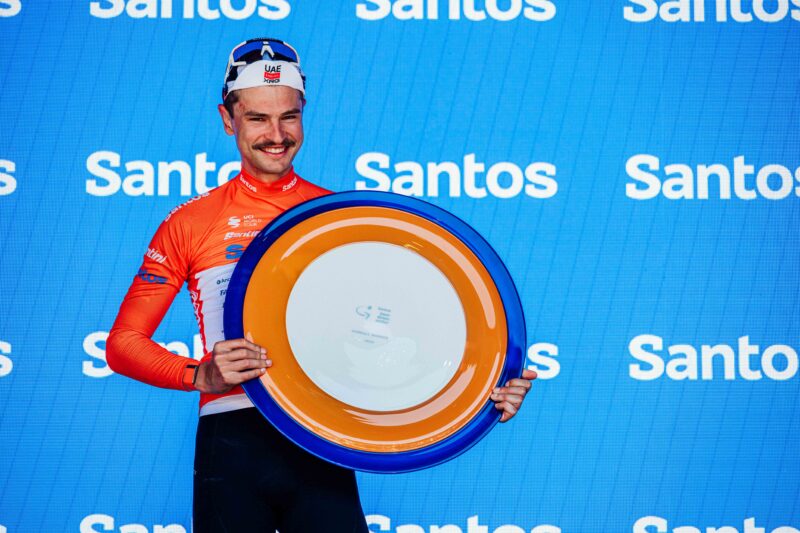Tour de France 2016 preview
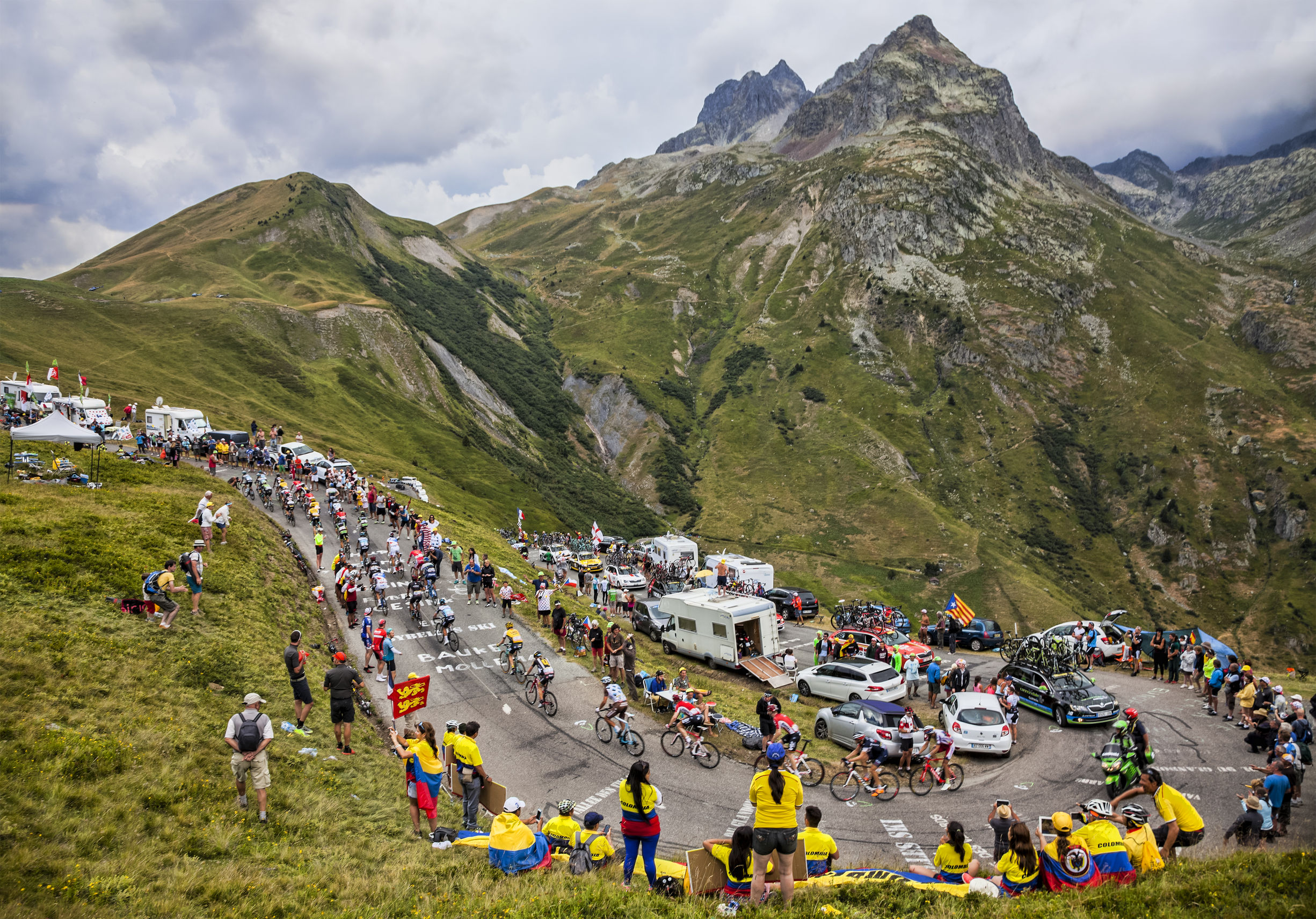
There’s nothing quite like the Tour de France. Iain Treloar runs you through the route, the riders and the romance of this iconic event.
The Tour de France is a daily drama with an entire nation its stage, and a transfixed global audience. Now in its 103rd year, this venerable race has seen it all: triumph, scandal, heartbreak. For Australian fans, the Tour holds a particularly special place in our hearts. Its roads have been the setting for some of our nation’s greatest triumphs on a bike, and for generations of sporting fans, the event has served as a gateway to a love of cycling. There’s also the more immediate annual impact of an epidemic of sleep deprivation, as we seek our nightly escape from the dreariness of winter.
It’s tricky to put a finger on just one reason why the Tour de France is so beloved. It isn’t the hardest race in the calendar—that honour goes to the Giro d’Italia or Vuelta a España, depending on how masochistic the organisers are feeling in a given year. But it is probably the most beautiful. Viewers are treated to a shifting kaleidoscope of gorgeous scenes—a technicolour peloton winding its way through bucolic farmland; impossibly jagged mountain ranges, still capped with snow even in the height of summer; cheery fields of sunflowers loomed over by medieval castles; the rolling hills and crashing surf of the north of France.
These landscapes are enriched by the sporting specifics. A Grand Tour is something like a game of chess on wheels, with teams deploying pawns up the road to protect their king. Each shift in wind or incline brings an opportunity for a brave attack, and each stage finish has the potential for heart-stopping, nail-biting tragedy or triumph. There are constant skirmishes on the climbs, followed by death-defying descents. There are races within the race, for classifications and time bonuses. Every pedal stroke, in its own small way, is meaningful, deliberate and potentially decisive.
What do you need to know about the 2016 edition?
This year’s course, in a nutshell, is one for the mountain goats, with 28 categorised climbs (three more than last year). Elements that shifted the balance from pure climbers in previous years—like the cobbled stages of 2014 and 2015—are off the agenda; so too is the prologue and team time trial. Instead, we get a mountain time-trial in the last week, which should go some way to nullifying the advantage that gifted time-trialists like Chris Froome carry against the clock.
There’s been a trend away from pure sprint stages over recent years, too, with an increase in the number of short, steep climbs to the finish line of non-mountain stages (see stages 2, 10 and 16). This means GC riders (General Classification, or those competing for the yellow jersey) need to be particularly vigilant that they don’t get caught out, and makes for much more compelling, gutsy racing throughout instead of sprint-train processions.
The other novel feature this year is the potentially decisive positioning of descents on the mountain stages. The first day in the Pyrenees finishes with a technical descent to the line—rather than a summit finish—and the last desperate moments of stage 20, the day before Paris, are on a descent too. This will be an absolutely scintillating spectacle, as if it’s a close race, the best bike-handler—or bravest—may be able to snatch overall honours.
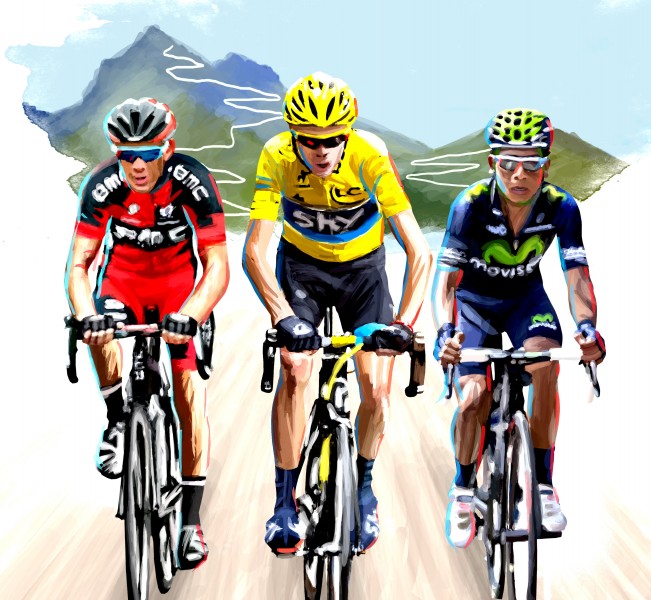
Who are the favourites?
The first tier of contenders for the yellow jersey are all former Grand Tour winners, who have structured their entire season around the race.
Chris Froome: The leading favourite, Froome is the defending champion from last year, also took the title in 2014, and finished second to Bradley Wiggins in 2013. Froome is a determined character backed by a powerhouse team, and he should bring a good deal of confidence to this year’s race, having prevailed despite repeated attacks from more fancied climbers in 2015. His early season form wasn’t the best, but he took the win at the Criterium du Dauphine—a feat that preceded both his previous Tour de France wins—and looks on track for a methodical defense of his title. If disaster should strike, there’s a deep pool of talent in his team capable of animating the race.
Nairo Quintana: With two second-places at the Tour behind Chris Froome, and a Giro d’Italia (2014) victory already under his belt, Nairo Quintana is a legitimate superstar. The tiny Colombian is a superb climber, thriving in particularly steep terrain, and has made significant improvements to his time trial over recent years. A hugely courageous performance as runner-up in the 2015 Tour won him many fans, and the course this year is arguably even better suited to his abilities. While the bookies may have Chris Froome as the favourite, you shouldn’t be at all surprised if Quintana pulls out a very popular victory. He’ll likely have Alejandro Valverde as an offsider.
Alberto Contador: The greatest Grand Tour rider of his generation, Alberto Contador is in the twilight of his career—this year’s Tour is expected to be his last. But that isn’t to say that he’s not in with a chance of victory. Contador attempted an audacious Giro/Tour double in 2015, winning the former but trailing in a fatigued fifth in the latter. For 2016, his focus is squarely on the Tour, and his form thus far is extremely promising, with podium places in Paris Nice, Volta a Catalunya and Tour of the Basque Country. Contador races with flair and even if he doesn’t win, he’ll be all guts and glory in the attempt. Despite a tarnished past, it’ll be sad to see him go.
Fabio Aru: The young Italian makes his Tour de France debut, as the newly anointed team leader of Astana. Aru’s record in Grand Tours is impressive—winner of the Vuelta and 2nd in the Giro in 2015, and 3rd in the 2014 Giro at just 23 years of age. He’s a spectacular, tenacious climber, but will need to limit his losses in the first time trial to come out on top. Astana may have another ace up their sleeve should Aru falter, with reigning-Giro champ (and 2014 Tour winner) Vincenzo Nibali also selected for the squad.
Australian ambitions
Richie Porte: The sole Australian GC hope, Porte has moved from a role as Chris Froome’s key lieutenant at Team Sky to leadership at BMC Racing Team. The Tasmanian’s skills are indisputable—he’s one of the best in the game over week-long tours, having chalked up victories over the years in important pre-Tour indicator events, Paris–Nice and Volta a Catalunya. However, his track-record in three-week Grand Tours is a little patchy in comparison, with a reputation of dropping from contention with a bad day or illness. He’s not favourite to win, but if he manages to stay healthy, there’s no reason he shouldn’t be considered an outside chance. One possible complication could come from within his own camp, in the form of his team-mate Tejay van Garderen, who goes to the Tour as BMC’s co-leader.
The local heroes
After a lean couple of decades, the French desperately want a homegrown Tour de France winner. In the past few years four young riders, each capable of a top 10 finish, have emerged.
Thibaut Pinot is probably the host country’s best chance of a strong showing, having finished on the podium in 2014. He’s a strong climber and has worked to improve his time-trialling, but his team lack a little strength in comparison to the leading rivals.
Pierre Rolland has had a change of scenery, moving to the US-based Cannondale-Drapac Pro Cycling Team after a number of successful years with Europcar. He’s still yet to finish on the podium of a Grand Tour, but Cannondale has a stronger line-up than he’s had at his disposal previously, with solid support from a young, talented team.
Romain Bardet is one of the most exciting young prospects in French cycling, and put in an impressive showing at the 2015 Tour, winning a stage and the overall combativity award and finishing 9th. He’s great to watch and will light up the race when it hits the mountains.
The mercurial climber Warren Barguil hasn’t had any wins since his breakthrough pair of stage victories in the 2013 Vuelta, but managed an impressive 14th place in last year’s Tour despite riding with a fractured knee. He’s probably more of a chance for stage wins than the overall, but he’s one to keep an eye on.
With all of this and more in store, the 2016 Tour de France is set to be a scintillating spectacle.
How to watch the Tour de France
SBS will be televising every stage live, with highlights packages every morning and evening. For viewing schedules in your state or to stream the race online, visit sbs.com.au/cyclingcentral/

THE STAGES
*recommended viewing
Stage 1 – Saturday 2 July
Mont-Saint-Michel – Utah Beach Sainte-Marie-du-Mont 188km
World-famous Mont-Saint-Michel is the starting point, before progressing to the D-Day landing point of Utah Beach. It’s a flat start to the Tour so expect a sprinter to snare the first yellow jersey.
Stage 2 – Sunday 3 July
Saint-Lô – Cherbourg-en-Cotentin 182km
Those hoping for a high overall finish will need to be attentive not to let any gaps open up so early in the Tour, with the potential for small time gaps on the final climb to the finish—a 3km ascent with a stretch at 14 per cent.
Stage 3 – Monday 4 July
Granville – Angers 222km
Another one for the sprinters, this long day in the saddle will take riders from the coast into France’s interior.
Stage 4 – Tuesday 5 July
Saumur – Limoges 232km
The longest stage of this year’s race is a fairly flat affair, but the GC contenders will need to stay alert if it’s windy.
Stage 5 – Wednesday 6 July *
Limoges – Le Lioran 216km
A closing sequence of three short steepish climbs, before a fast finish. Although none of the climbs are epics, this will be the first serious hit-out for the GC riders.
Stage 6 – Thursday 7 July
Arpajon-sur-Cère – Montauban 187km
This is likely to be a tussle between the teams of the sprinters and a breakaway.
Stage 7 – Friday 8 July *
L’Isle-Jourdain – Lac de Payolle 162km
The first stage in the Pyrenees features only one major climb, the Col d’Aspin, followed by a technical descent and short rise to the finish.
Stage 8 – Saturday 9 July *
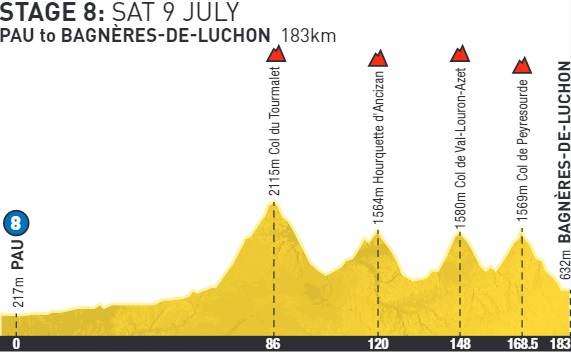
Pau – Bagnères-de-Luchon 183km
Site of Michael Rogers’ famous victory in 2014, this stage features four major climbs including the Col de Peyresourde, with a descent to the line.
Stage 9 – Sunday 10 July *
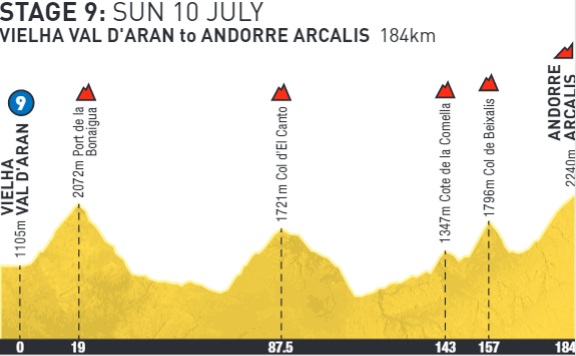
Vielha Val d’Aran – Andorre Arcalis 184km
Another massive Pyrenean stage, with five categorised climbs and a summit finish as the peloton crosses through Spain and Andorra. The final 45km will be mandatory viewing.
Rest Day – Monday 11 July
Andorra
Stage 10 – Tuesday 12 July
Escaldes-Engordany – Revel 198km
This stage seems destined for a breakaway, with a tough 6km climb to the finish likely to nullify the sprinters.
Stage 11 – Wednesday 13 July
Carcassonne – Montpellier 164km
Starting in the shadows of Carcassonne’s famous citadel, this stage is an opportunity for the sprinters to show their strength.
Stage 12 – Thursday 14 July
Montpellier – Mont Ventoux 185km *
Bastille Day brings the peloton to one of cycling’s truly iconic climbs, winding through Provence before a summit finish on Mont Ventoux (15.7km at 8.8%).
Stage 13 – Friday 15 July
Bourg-Saint-Andéol – La Caverne du Pont-d’Arc 37km
A rolling individual time trial, more challenging than the profile suggests, with a 7km climb to begin and 3km climb to finish.
Stage 14 – Saturday 16 July
Montélimar – Villars-les-Dombes Parc des Oiseaux 208km
Most likely one for the sprinters, with a potentially wind-affected finale.
Stage 15 – Sunday 17 July *
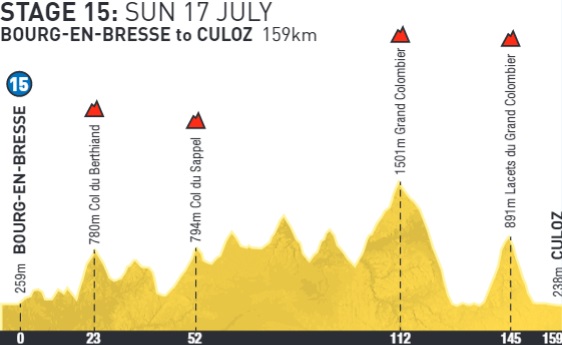
Bourg-en-Bresse – Culoz 159km
Not one to miss, this stage tackles two sides of the Grand Colombier, with a technical descent closing out the action. The last 60km will make for thrilling viewing.
Stage 16 – Monday 18 July
Moirans-en-Montagne – Bern 206km
The Tour crosses into Switzerland with a punchy climb to the finish in the historic capital, Bern. Can hometown hero Fabian Cancellara take the win in his final Tour?
Rest Day – Tuesday 19 July
Bern
Stage 17 – Wednesday 20 July *
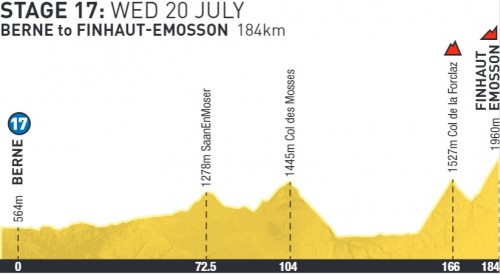
Bern – Finhaut-Emosson 184km
An entirely Swiss stage, rolling hills give way to a brutal last 31km—13km at 7.9%, then a descent, then 10.4km at 8.4% to a scenic summit finish. Not to be missed.
Stage 18 – Thursday 21 July *
Sallanches – Megève 17km
Far from straightforward, this is a tough climbers’ time trial of changing gradients, including a very nasty 2km of 10+ per cent.
Stage 19 – Friday 22 July *
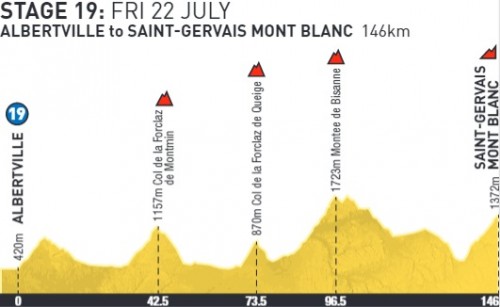
Albertville – Saint-Gervais Mont Blanc 146km
The first of two spectacular Alpine stages. There’s a summit finish to conclude the day, but the preceding Mont Bisanne may prove more decisive.
Stage 20 – Saturday 23 July *
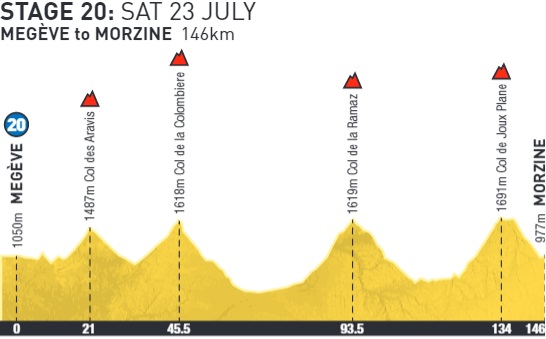
Megève – Morzine 146km
With four categorised climbs to tackle—including the brutal Col de Joux Plane—followed by a descent to finish line, this will be a desperate, high-stakes battle to consolidate the final GC.
Stage 21 – Sunday 24 July *
Chantilly – Paris Champs-Élysées 113km
The curtain is dropped after a spectacular three weeks of racing in Paris, against the iconic backdrop of the Eiffel Tower and the Arc d’Triomphe. Who’ll win the last sprint?
THE TEAMS
WorldTour:
 AG2R La Mondiale (Fra) Bikes: Focus Componentry: SRAM
AG2R La Mondiale (Fra) Bikes: Focus Componentry: SRAM
Romain Bardet (Fra), Domenico Pozzovivo (Ita), Jan Bakelants (Bel), Michael Chérel (Fra), Samuel Dumoulin (Fra), Ben Gastauer (Lux), Cyril Gautier (Fra), Alexis Gougeard (Fra), Alexis Vuillermoz (Fra)
Team objectives: GC for Romain Bardet, with Pozzovivo a strong backup.
 Astana Pro Team (Kaz) Bikes: Specialized Componentry: Campagnolo
Astana Pro Team (Kaz) Bikes: Specialized Componentry: Campagnolo
Fabio Aru (Ita), Vincenzo Nibali (Ita), Jakob Fuglsang (Den), Andrei Grivko (Ukr), Tanel Kangert (Est), Alexey Lutsenko (Kaz), Diego Rosa (Ita), Luis Leon Sanchez (Spa), Paolo Tiralongo (Ita)
Team objectives: GC victory for Fabio Aru, with Vincenzo Nibali as backup.
 BMC Racing Team (USA) Bikes: BMC Componentry: Shimano
BMC Racing Team (USA) Bikes: BMC Componentry: Shimano
Richie Porte (Aus), Tejay van Garderen (USA), Greg Van Avermaet (Bel), Brent Bookwalter (USA), Marcus Burghardt (Ger), Damiano Caruso (Ita), Rohan Dennis (Aus), Amaël Moinard (Fra), Michael Schär (Sui)
Team objectives: GC for team leaders Porte and van Garderen.
 Cannondale-Drapac Pro Cycling Team (USA) Bikes: Cannondale Componentry: Shimano
Cannondale-Drapac Pro Cycling Team (USA) Bikes: Cannondale Componentry: Shimano
Pierre Rolland (Fra), Lawson Craddock (USA), Matti Breschel (Den), Alex Howes (USA), Kristijan Koren (Slo), Sebastian Langeveld (Ned), Ramunas Navardauskas (Ltu), Tom-Jelte Slagter (Ned), Dylan Van Baarle (Ned)
Team objectives: GC for Pierre Rolland.
 Dimension Data (RSA) Bikes: Cervelo Componentry: Shimano
Dimension Data (RSA) Bikes: Cervelo Componentry: Shimano
Mark Cavendish (GBr), Edvald Boasson Hagen (Nor), Daniel Teklehaimanot (Eri), Reinardt Janse van Rensburg (RSA), Natnael Berhane (Eri), Steve Cummings (GBr), Bernhard Eisel (Aut), Serge Pauwels (Bel), Mark Renshaw (Aus)
Team objectives: Stage wins for Cavendish and Boasson Hagen.
 Etixx – Quick Step (Bel) Bikes: Specialized Componentry: Shimano
Etixx – Quick Step (Bel) Bikes: Specialized Componentry: Shimano
Marcel Kittel (Ger), Dan Martin (Irl), Tony Martin (Ger), Julian Alaphilippe (Fra), Iljo Keisse (Bel), Maximiliano Richeze (Arg), Fabio Sabatini (Ita), Petr Vakoc (Cze), Julien Vermote (Bel)
Team objectives: Stage wins for Kittel; GC for Dan Martin.
 FDJ (Fra) Bikes: Lapierre Componentry: Shimano
FDJ (Fra) Bikes: Lapierre Componentry: Shimano
Thibaut Pinot (Fra), Steve Morabito (Sui), Sebastien Reichenbach (Sui), Cedric Pineau (Fra), William Bonnet (Fra), Matthieu Ladagnous (Fra), Arthur Vichot (Fra), Anthony Roux (Fra), Jeremy Roy (Fra)
Team objectives: GC for Thibaut Pinot.
 IAM Cycling (Swi) Bikes: Scott Componentry: Shimano
IAM Cycling (Swi) Bikes: Scott Componentry: Shimano
Stef Clement (Ned), Jerome Coppel (Fra), Leigh Howard (Aus), Martin Elmiger (Sui), Mathias Frank (Sui), Reto Hollenstein (Sui), Sondre Holst Enger (Nor), Oliver Naesen (Bel), Jarlinson Pantano (Col)
Team objectives: Stage victories; breakaways.
 Lampre – Merida (Ita) Bikes: Merida Componentry: Shimano
Lampre – Merida (Ita) Bikes: Merida Componentry: Shimano
Rui Costa (Por), Louis Meintjes (RSA), Yukiya Arashiro (Jpn), Matteo Bono (Ita), Davide Cimolai (Ita), Kristijan Durasek (Cro), Tsgabo Grmay (Eth), Luka Pibernik (Slo), Jan Polanc (Slo)
Team objectives: GC for Meintjes and Costa.
 Lotto Soudal (Bel) Bikes: Ridley Componentry: Campagnolo
Lotto Soudal (Bel) Bikes: Ridley Componentry: Campagnolo
André Greipel (Ger), Jürgen Roelandts (Bel), Lars Bak (Den), Thomas De Gendt (Bel), Jens Debusschere (Bel), Tony Gallopin (Fra), Adam Hansen (Aus), Greg Henderson (NZl), Marcel Sieberg (Ger)
Team objectives: Stage victories for Greipel.
 Movistar Team (Spa) Bikes: Canyon Componentry: Campagnolo
Movistar Team (Spa) Bikes: Canyon Componentry: Campagnolo
Nairo Quintana (Col), Alejandro Valverde (Spa), Daniel Moreno (Spa), Winner Anacona (Col), Imanol Erviti (Spa), Jesus Herrada (Spa), Gorka Izaguirre (Spa), Ion Izaguirre (Spa), Nelson Oliveira (Por)
Team objectives: GC victory for Quintana.
 Orica Bike-Exchange (Aus) Bikes: Scott Componentry: Shimano
Orica Bike-Exchange (Aus) Bikes: Scott Componentry: Shimano
Simon Gerrans (Aus), Michael Matthews (Aus), Adam Yates (GBr), Mathew Hayman (Aus), Michael Albasini (Sui), Luke Durbridge (Aus), Daryl Impey (RSA), Christopher Juul-Jensen (Den), Ruben Plaza (Spa)
Team objectives: Stage wins for Gerrans and Matthews.
 Team Giant – Alpecin (Ger) Bikes: Giant Componentry: Shimano
Team Giant – Alpecin (Ger) Bikes: Giant Componentry: Shimano
Warren Barguil (Fra), John Degenkolb (Ger), Tom Dumoulin (Ned), Laurens Ten Dam (Ned), Simon Geschke (Ger), Roy Curvers (Ned), Georg Preidler (Aut), Ramon Sinkeldam (Ned), Albert Timmer (Ned)
Team objectives: GC for Barguil; stage victories for Degenkolb.
 Team Katusha (Rus) Bikes: Canyon Componentry: SRAM
Team Katusha (Rus) Bikes: Canyon Componentry: SRAM
Joaquim Rodriguez (Spa), Alexander Kristoff (Nor), Jurgen Van den Broeck (Bel), Ilnur Zakarin (Rus), Jacopo Guarnieri (Ita), Marco Haller (Aut), Alberto Losada (Spa), Michael Mørkøv (Den), Angel Vicioso (Spa)
Team objectives: Stage wins for Kristoff; GC for Rodriguez and Zakarin.
 Team Lotto NL – Jumbo (Ned) Bikes: Bianchi Componentry: Shimano
Team Lotto NL – Jumbo (Ned) Bikes: Bianchi Componentry: Shimano
Wilco Kelderman (Ned), Sep Vanmarcke (Bel), George Bennett (NZl), Dylan Groenewegen (Ned), Bert-Jan Lindeman (Ned), Paul Martens (Ger), Timo Roosen (Ned), Robert Wagner (Ger), Maarten Wynants (Bel)
Team objectives: High overall finish for Kelderman.
 Team Sky (GBR) Bikes: Pinarello Componentry: Shimano
Team Sky (GBR) Bikes: Pinarello Componentry: Shimano
Chris Froome (GBr), Geraint Thomas (GBr), Mikel Landa (Spa), Mikel Nieve (Spa), Wout Poels (Ned), Sergio Henao (Col), Vasil Kiryienka (Blr), Luke Rowe (GBr), Ian Stannard (GBr)
Team objectives: GC for Froome. Landa, Nieve, Thomas as plan B.
 Tinkoff (Rus) Bikes: Specialized Componentry: Shimano
Tinkoff (Rus) Bikes: Specialized Componentry: Shimano
Alberto Contador (Spa), Peter Sagan (Svk), Rafal Majka (Pol), Roman Kreuziger (Cze), Maciej Bodnar (Pol), Oscar Gatto (Ita), Robert Kiserlovski (Cro), Matteo Tosatto (Ita), Michael Valgren (Den)
Team objectives: GC for Contador; green jersey and stage wins for Sagan.
 Trek – Segafredo (USA) Bikes: Trek Componentry: Shimano
Trek – Segafredo (USA) Bikes: Trek Componentry: Shimano
Fabian Cancellara (Sui), Bauke Mollema (Ned), Frank Schleck (Lux), Haimar Zubeldia (Spa), Markel Irizar (Spa), Gregory Rast (Sui), Peter Stetina (USA), Jasper Stuyven (Bel), Edward Theuns (Bel)
Team objectives: GC for Mollema; stage wins for Cancellara.
Wildcards:
 Bora – Argon 18 (Ger) Bikes: Argon 18 Componentry: Shimano
Bora – Argon 18 (Ger) Bikes: Argon 18 Componentry: Shimano
Sam Bennett (Irl), Shane Archbold (NZl), Jan Barta (Cze), Cesare Benedetti (Ita), Emanuel Buchmann (Ger), Bartosz Huzarski (Pol), Patrick Konrad (Aut), Andreas Schillinger (Ger), Paul Voss (Ger)
Team objectives: Stage wins for Sam Bennett.
 Cofidis, Solutions Crédits (Fra) Bikes: Orbea Componentry: Shimano
Cofidis, Solutions Crédits (Fra) Bikes: Orbea Componentry: Shimano
Daniel Navarro (Spa), Luis Angel Mate (Spa), Borut Bozic (Slo), Jerome Cousin (Fra), Nicolas Edet (Fra), Christophe Laporte (Fra), Cyril Lemoine (Fra), Arnold Jeanesson (Fra), Geoffrey Soupe (Fra)
Team objectives: High GC for Dani Navarro; otherwise, breakaways.
 Direct Energie (Fra) Bikes: BH Componentry: Shimano
Direct Energie (Fra) Bikes: BH Componentry: Shimano
Sylvain Chavanel (Fra), Thomas Voeckler (Fra), Bryan Coquard (Fra), Antoine Duchesne (Can), Yohann Gene (Fra), Fabrice Jeandesboz (Fra), Adrien Petit (Fra), Angelo Tulik (Fra), Romain Sicard (Fra)
Team objectives: Breakaways – look out for Chavanel and Voeckler.
 Fortuneo – Vital Concept (Fra) Bikes: Look Componentry: Shimano
Fortuneo – Vital Concept (Fra) Bikes: Look Componentry: Shimano
Chris Anker Sorensen (Den), Eduardo Sepúlveda (Arg), Vegard Breen (Nor), Anthony Delaplace (Fra), Brice Feillu (Fra), Armindo Fonseca (Fra), Daniel McLay (GBr), Pierre-Luc Perichon (Fra), Florian Vachon (Fra)
Team objectives: Breakaways; GC for Sepulveda.


